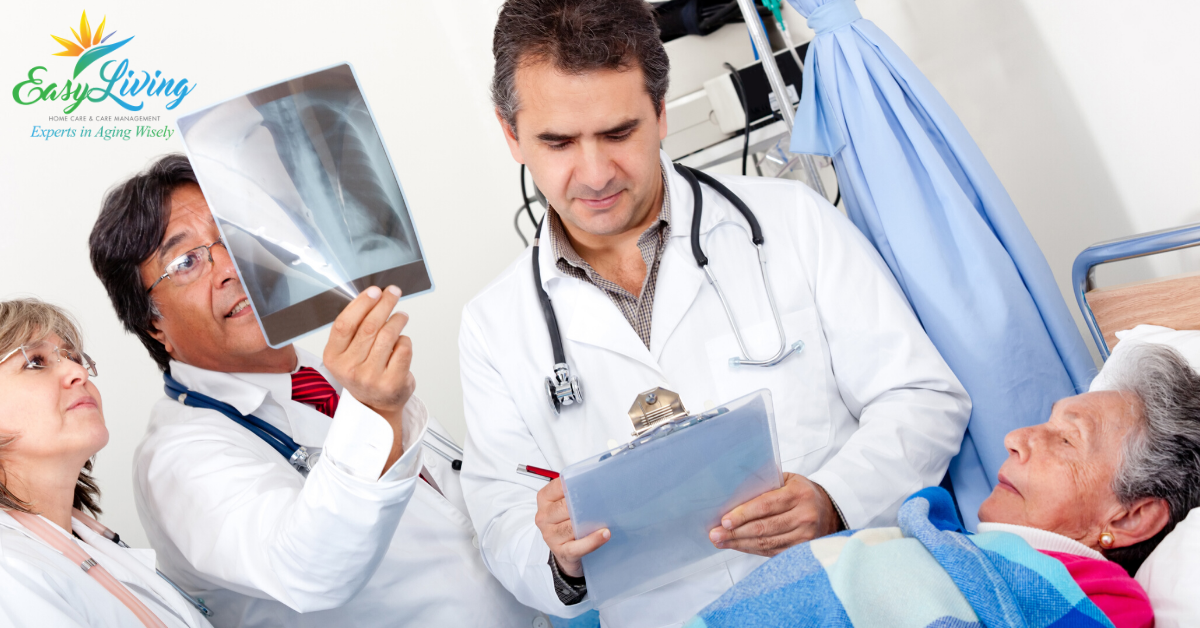Elders account for one-third of all hospitalizations, though they make up only 12% of the U.S. population. What are the top reasons for these hospitalizations?
According to data from the Agency for Healthcare Research and Quality, Centers for Disease Control, and National Institutes of Health, the top causes for hospitalizations in the elderly are:
- Cardiac arrhythmias
- Congestive heart failure
- Chronic obstructive pulmonary disease (COPD)
- Coronary atherosclerosis
- Diabetes
- Infection
- Medication problems
- Pneumonia
- Stroke
- Falls/accidents
Congestive heart failure and pneumonia are often the top two reasons for hospitalizations for those 65 and older.
What do the top reasons for hospitalizations in elders tell us?
Most of the hospitalizations occur because of complications of chronic conditions. This provides two key takeaways. First, we should all be practicing good preventative care to minimize chronic conditions. Many of these conditions have strong associations with lifestyle causes. This includes the cardiac issues, COPD, stroke, and diabetes. If we could reduce these by even a small amount, we would see many fewer hospitalizations.
Second, elders need good medical management and coordination. Anyone with a chronic condition should be getting regular checkups, monitoring their condition and key indicators, and using good overall health practices. They also need to ensure proper communication and coordination with and between health providers.
There are also many simple things elders and their families can be doing to prevent some of these hospitalizations. This is particularly relevant to infections, falls, and medication problems.
What to Do: Preventing Unnecessary Hospitalizations
1. Practice preventative care.
Get your flu shot, pneumonia vaccine, and all recommended screenings. Here is more about preventative care, plus the ways we can help to make sure you access all the care you need.
Prevention of common issues that land elders in the hospital:
Some other things we see that often lead to hospitalizations in elders include urinary tract infections (UTIs), bowel obstructions/severe constipation, and dehydration. We also cover falls and medication problems below. All of these are preventable but easily overlooked by elders until it is too late.
An elder can build good practices into their daily life to keep these things from becoming an issue. For example, elders need to drink plenty of fluids and eat well. We often find that a fear of falling or disrupted sleep makes elders try to avoid nighttime bathroom trips. Therefore, they don’t drink enough. While this may save on sleep, it causes the person to become dehydrated or get a UTI. Similarly, a healthy diet helps prevent many of these issues. But, these practices can be easier said than done. So, if you are worried about a loved one or they’ve had previous hospitalizations, consider getting help.
Along with putting daily practices in place to support health, elders or their caregivers need to watch for signs of trouble. For example, sudden confusion or change in mental state is often a key indicator of a UTI or infection. You can easily spot dehydration by looking at skin elasticity and urine color. We train our EasyLiving caregivers to spot these issues. And, we develop a care plan around monitoring and preventing them.
2. Know what to watch for and monitor for warning signs.
Congestive heart failure is one of the top reasons for hospitalizations. The Heart Association emphasizes the importance of monitoring symptoms and making small changes. This can help you avoid crises that lead to hospitalizations. Similarly, most patients can manage their diabetes well at home. However, if you aren’t watching closely and managing your diabetes carefully, diabetic complications can land you in the hospital.
Know the signs of heart attack and stroke so you can get help right away. Also, if your loved one has had a stroke, be sure they have the support they need throughout the stroke recovery process.
Since many elders manage multiple conditions and may have functional difficulties, it is worth considering home care assistance. A home caregiver can prepare healthy meals and be sure you take your medications as indicated. They can also watch for warning signs, help with hygiene and safety, and more.
3. Get a regular medication review and use medication management services.
The National Center for Health Statistics reported that approximately 1/3 of persons 60+ take five or more prescription medications. This leads to a lot of problems properly managing the medications. And, many elders deal with side effects and drug interactions. Every senior who takes medications should get a regular medication review. Additionally, be sure all doctors have your full list of updated meds. Many seniors will benefit from help with medications. This can range from a reminder system (we covered this in our article on home care technologies, many of which are useful in prevention) to medication assistance.
4. Make your home safe from falls and accidents.
Many falls are preventable. Environmental factors often cause falls. For example, tripping on wires or rugs, slipping on a wet floor, or stumbling when reaching for an item. You can take simple steps to prevent falls and other accidents around your home.
Download our free Home Safety Checklist and consider getting a comprehensive home assessment.
Contact us to schedule a free consultation about how to prevent unnecessary hospitalizations. Our care managers provide comprehensive assessments, care coordination, and crisis management. If your loved one has been hospitalized, we can offer advocacy and help create an effective discharge plan so they stay safe.

